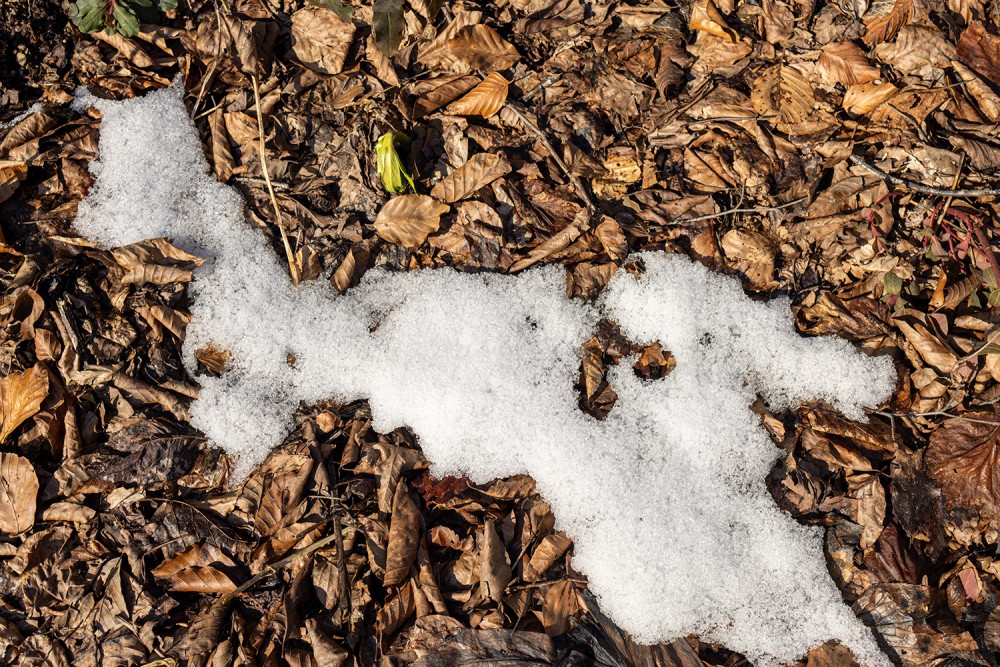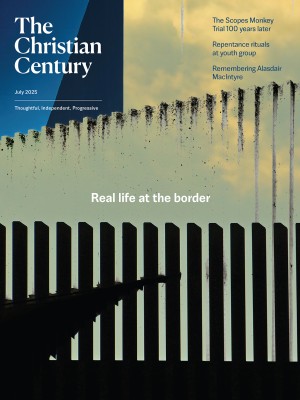A farewell to snow
Louise Erdrich’s Future Home of the Living God reminds me how much we have to mourn as we enter a climate dystopia.

Photo by BAMM-BAMM / iStock / Getty
Last summer I led a book club discussion on Louise Erdrich’s dystopian novel Future Home of the Living God. The online gathering was organized by a nonprofit that focuses on spirituality for a climate-changed world. I was glad to talk about one of my favorite novelists.
Erdrich, who is enrolled in the Turtle Mountain Band of Chippewa, is a prolific writer whose stories of Natives on and off reservation are haunting and humorous and often break my heart. I hadn’t read Future Home of the Living God before. It’s a bit different from many of her novels: set in Minneapolis in the not too distant future, it tells the story of a young woman who was adopted out of a tribe farther north in Minnesota and is now pregnant. In this dystopian future, humans have stopped evolving or have begun devolving in ways not quite named. Pregnant women are being detained by the authorities and imprisoned in birthing centers. The implication—again, not narrated graphically—is that women bearing devolved fetuses will be terminated along with their children, while women bearing healthy fetuses will be forced to bear more in order to ensure the continued survival of the fittest.
Read our latest issue or browse back issues.
Apparently Erdrich started the novel and then shelved it for a decade. She picked it up again and finished it in 2017, when its plot was starting to sound less fantastic and more plausible. The book explores themes of political disintegration and human devolution. As the young woman’s pregnancy unfolds, she tries to evade the authorities while also reconnecting with her birth mother and Ojibwe family on the reservation.
A line early in the novel has stuck with me. The main character comments that it is sweltering in Minneapolis in the summer—and that in recent years the snow has stopped completely. From this passing remark and a few others, readers are to understand that the political and biological unraveling is being propelled by climate change.
Reading this last summer, it took no feat of imagination for me to think that a time is coming when Minnesota would be without snowfall. It had already started. I am in Minnesota regularly for work. My husband grew up in Minnesota, and his family is still there, as are many of our dear friends. We’d heard from them that past winter that week after week, month after month, there was little to no snow. First it was surprising. Then it was concerning and unnerving. The lack of snow would mean a dry spring and summer and would disrupt natural cycles for animals and plants, gardeners and farmers.
What the novel narrated in fiction was becoming real. The thought of it brought me to tears while reading it. I knew I loved snow, but I had no idea how much, or how unsettled and grieved I’d feel imagining a time when the snow would stop.
When I moved to Minnesota for college, I’d never seen so much snow. I’d been raised on the plains of Nebraska, where the snow blew across the prairie, regularly shutting down the interstate. But in Nebraska it would snow and blow, it would melt, the cold wind would whip over the barren fields, and then it would snow some more. The snowpack in Minnesota often began in October and did not finish melting until April. My senior year of college I became one of many who can remember where they were the afternoon the famed Halloween blizzard blew in, depositing feet of snow on campus overnight and then continuing for two more days, accumulating the most snow in one storm system in Minnesota’s history to that date.
As the snow persisted through the winter, never completely melting, the sunny days came, cold and dry, deceptive in their brightness as the sun glared off the snow. When I later moved to Chicago, I could not bear the gray, damp winters with little snow and less sun. I would still prefer −20 degrees with the sun shining off ample snow to foggy rain and slush. What I love most of all about snow is its stillness, the hush of the world after a steady snowfall, going out to walk in that stillness as the snow clings to the trunks of trees and their branches, glistening and swaying softly.
But I know that in Minnesota, and across the north, that ample snow has been diminishing. The winter before I read Erdrich’s novel, official weather reports confirmed what we’d heard from family and friends: Minnesota received less snow that winter than ever in its recorded history. The summer that ensued was sweltering, just like the summer before it and just like in the novel, and after the snowless winter, a drought ensued. Much of Minnesota remains in a moderate drought after another winter with slightly more precipitation but still meager snow. And although the earth has always had its cycles of precipitation and drought, the acceleration of the warming cycle is human-made—and likely too far gone for the problem to be human-solved.
I carry with me feelings of grief, despair, and anger at the knowledge that a few years ago we may have crossed the point of no return in the acceleration of climate change outcomes. What I grieve most is the diminishing of snow. As the climate warms, precipitation in the north will increasingly come in the form of rain, when it comes at all. Like in Erdrich’s novel, the day will come when the snow stops falling, and we will have only our memories of those hushed mornings and quiet walks, those sunny days of sun gleaming off the snowpack. I will remember them with longing and regret when they pass away, which will likely be in my lifetime.
This summer, I’m praying for miracles. The one I pray for the most is for the return of the snow.







